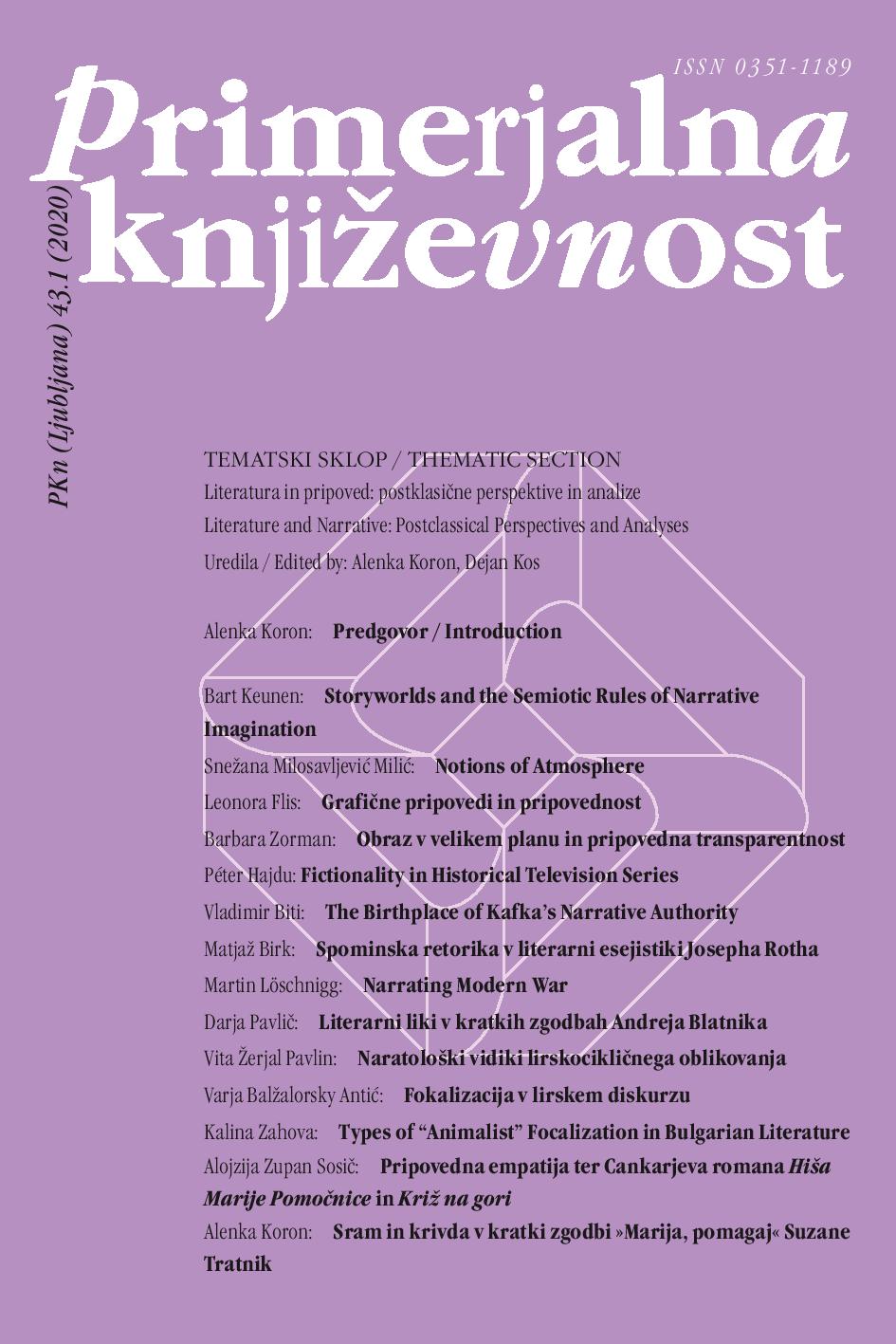Narrative Empathy and Ivan Cankar’s Novels The Ward of Mary Help of Christians and The Cross on the Mountain
DOI:
https://doi.org/10.3986/pkn.v43.i1.13Keywords:
Slovenian literature, Slovenian novel, Cankar, Ivan, narrative technique, literary reception, horizon of expectation, empathy, identification, autobiographical representationAbstract
This article explores narrative empathy associated with the novels The Ward of Mary Help of Christians and The Cross on the Mountain (both from 1904) by Ivan Cankar (1876–1918) in order to find out why the former, upon its publication, exceeded the readers’ horizon of expectation, thereby achieving less narrative empathy in readers, while the latter met their expectations to a greater degree at the receptive level, thus evoking more narrative empathy. I consider three paths, i.e. autobiographical representation, a high level of author’s empathy, aesthetics of production and the two possibilities for the readers to empathize – identification with the character and the narrative situation. The empathizing is also analyzed according to the three modes, so-called bounded, ambassadorial, and broadcast empathy. The disharmony between the empathy of the author and the reader shows that the novel The Ward of Mary Help of Christians received less empathy not because of the defectiveness of the empathy in the author but because of the defectiveness of the empathy in the readers of the novel. At the beginning of the twentieth century, Slovenian readers were unable to share the emotions and perspectives of this innovative novel, which is why they preferred The Cross on the Mountain. To explain the disharmony between the empathy of the author and the reader, the distinction between literary and trivial empathy also had to be taken into account; this difference again proves that the novel The Cross on the Mountain was suitable for the average reader open to trivial empathy, while The Ward of Mary Help of Christians required more demanding literary readers and their orientation towards literary empathy.
References
Adorno, W. Theodor. Beležke o literaturi. Prev. Mojca Savski idr. Ljubljana: Cankarjeva založba, 1999.
Andrieu, Bernard, in Gilles Boëtsch, ur. Rečnik tela. Prev. Olgica Stefanović. Beograd: Službeni glasnik, 2010.
Bernik, France. »Opombe«. Ivan Cankar. Zbrano delo. 12 (Gospa Judit, Križ na gori, Novele in črtice 1903–1904). Ur. France Bernik. Ljubljana: DZS, 1970.
Cankar, Ivan. Zbrano delo. 11 (Hiša Marije Pomočnice, Mimo življenja). Ur. Janko Kos. Ljubljana: DZS, 1972.
Cankar, Ivan. Zbrano delo. 12 (Gospa Judit, Križ na gori, Novele in črtice 1903–1904). Ur. France Bernik. Ljubljana: DZS, 1970.
Cankar, Ivan. Zbrano delo. 22 (Moje življenje, Grešnik Lenart). Ur. Janko Kos. Ljubljana: DZS, 1975.
Cankar, Izidor. Obiski. Ljubljana: Nova založba, 1920.
Cankar, Izidor. »Opombe«. Ivan Cankar. Izbrani spisi. 6. Ur. Izidor Cankar. Ljubljana: Nova založba, 1927.
Gerrig, J. Richard. »Why Literature Is Necessary, and Not Just Nice«. Cognitive Literary Studies: Current Themes and New Directions. Ur. Isabel Jaén in Julien Jacques Simon. Austin: University of Texas Press, 2012. 35–53.
Hoffman, Martin L. »Empathy and Prosocial Behavior«. Handbook of Emotions. Ur. Michael Lewis, Jeannette M. Haviland-Jones in Lisa Feldman Barrett. New York in London: The Guilford Press, 2008. 440–456.
Jauss, Hans Robert. Estetsko izkustvo in literarna hermenevtika. Prev. Tomo Virk. Ljubljana: Literarno-umetniško društvo Literatura, 1998.
Keen, Suzanne. »A Theory of Narrative Empathy«. Narrative 14/3 (2006): 207–236. Tudi na spletu.
Keen, Suzanne. Empathy and the Novel. Oxford in New York: Oxford UP, 2007.
Keen, Suzanne. »Introduction: Narrative and the Emotions«. Poetics Today 32/1 (2011): 1–53. Tudi na spletu.
Keen, Suzanne. »Narrative Empathy (Definition and Explication)«. The Living Handbook of Narratology. Ur. Peter Hühn. Hamburg: University of Hamburg, 2013. Tudi na spletu.
Keen, Suzanne. Narrative Form. New York in London: Palgrave Macmillan in St. Martin Press, 2015.
Kermauner, Taras. »Spremna beseda in opombe«. Ivan Cankar. Hiša Marije Pomočnice. Ljubljana: Mladinska knjiga, 1974. 99–113.
Koron, Alenka. Sodobne teorije pripovedi. Ljubljana: Založba ZRC, ZRC SAZU, 2014.
Kos, Janko. »Opombe«. Ivan Cankar. Zbrano delo. 11 (Hiša Marije Pomočnice, Mimo življenja). Ur. Janko Kos. Ljubljana: DZS, 1972. 285–340.
Krznaric, Roman. Empatija: temeljna kvaliteta za ostvarivanje revolucionarnih promjena u 21. stoljeću. Prev. Aleksandra Barlović. Zagreb: Planetopija, 2014.
Nussbaum, Martha C. Cultivating Humanity. Cambridge: Harvard UP, 1997.
Nussbaum, Martha C. Pjesnička pravda. Književna imaginacija i javni život. Prev. Marina Miladinov. Zagreb: Naklada Deltakont, 2005.
Pezdirc Bartol, Mateja. »Vloga bralca v poglavitnih literarnoteoretičnih smereh 20. stoletja: I. del«. Jezik in slovstvo 45/5 (1999/2000): 195–205.
Popović, Tanja. Rečnik književnih termina. Beograd: Logos Art, 2010.
Reissland, Nadja. The Development of Emotional Intelligence. New York: Routledge, 2012.
Schneider, Ralf. »Emotion and Narrative«. Routledge Encyclopedia of Narrative Theory. Ur. David Herman, Manfred Jahn in Marie-Laure Ryan. London in New York: Routledge, 2008. 136–137.
Virk, Tomo. Etični obrat v literarni vedi. Ljubljana: Literarno-umetniško društvo Literatura, 2018.
Zupan Sosič, Alojzija. »Narrative Empathy in Two Novels by Ivan Cankar«. Problemi slovjanoznanstva (Problems of Slavonic Studies) 66. Lvo: Ivan Franko National University, 2017. 102–112.
Zupan Sosič, Alojzija. »Postklasična teorija pripovedi«. Slavistična revija 61/3 (2013): 495–507.
Zupan Sosič, Alojzija. »Romani«. Ivan Cankar: literarni revolucionar. Ur. Aljoša Harlamov. Ljubljana: Cankarjeva založba, 2018. 201–235.
Zupan Sosič, Alojzija. Teorija pripovedi. Maribor: Litera, 2017.


